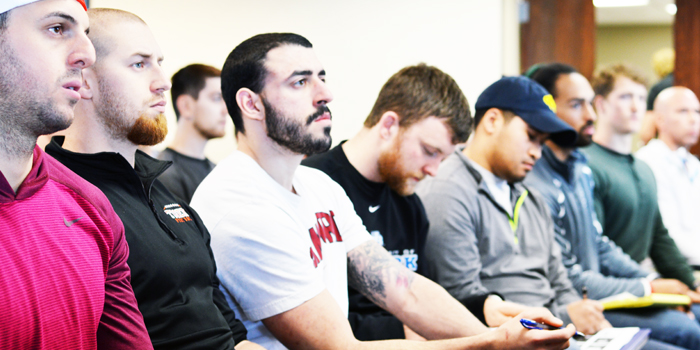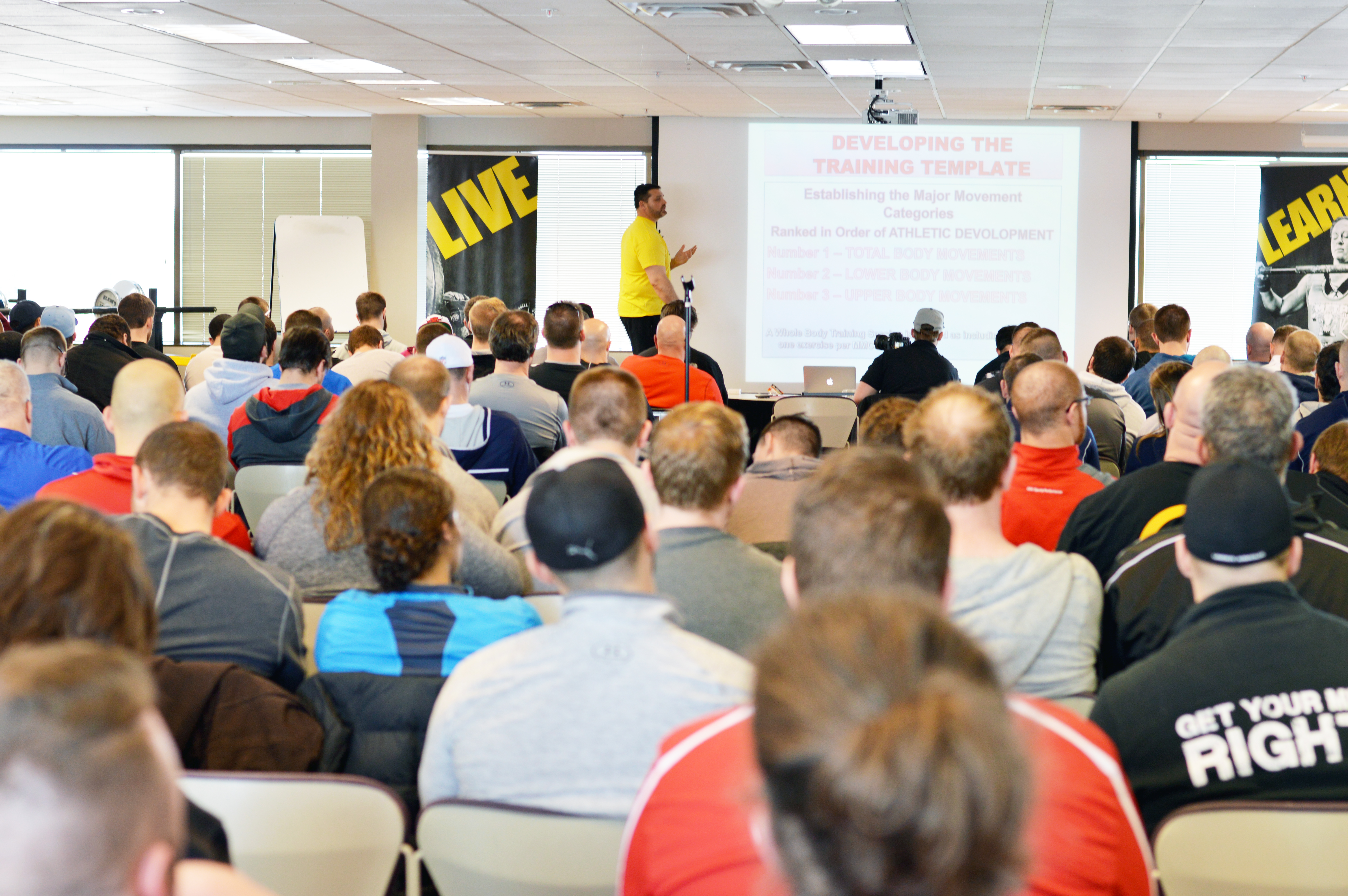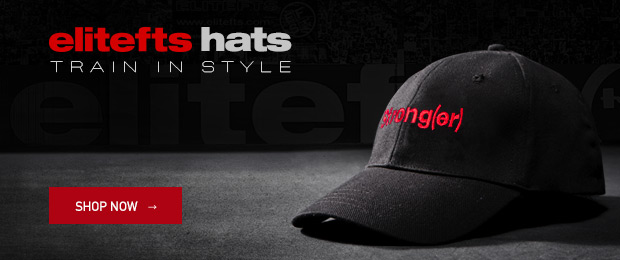
Before you read this article, I have to apologize in advance for two things. The first of which is that I’m going to sound exactly like Coach Hamer throughout this entire publication. I find myself slowly morphing into a version of my former boss which has made me a much more self-aware coach/human being but also scares the heck out of me. Now, I haven’t gone as far as to pick up his love for 5k marathons, or books about how price tags came into existence, but I have changed my lifting music from Drake to metal (I’m still holding strong to Fetty Wap).
The second reason I need to apologize is that this article was not made with consideration of the masses. This article was written with about 5% of coaches in the industry in mind. I see a lot of coaches around my age and especially young guys just starting out that talk the talk but fail to walk the walk. How many times do we use these lines with our athletes: “we need to find a leader in this group” or my other favorite “it’s about more than being a dude on the field; I want to see you lead off the field as well.” We are asking our athletes to ignore outside distractions, be a part of something bigger than themselves, and work towards one common goal: winning a championship. We want them to step up and become leaders on and off the field. The question I ask of you, though, is this: are you doing the same thing?
As a coach, it’s my job to inform my athletes. I need to know what I don’t know in order to learn what I don’t know to teach my athletes what they don’t know. I owe it to my athletes to be more than a “sets and reps guy,” but a role model on and off the field. As a leader I need to hold myself to a higher standard than I do of anyone else, being as all roads start and end with me. I expect that on weekends my athletes may go out and do some dumb drunk-athlete thing that winds up on some social media outlet. I should never be caught in that same situation. I personally have a higher level of expectation for myself than I do my athletes due only to the fact that I expect a young 18-21 year old to make the occasional slip up, as a leader of young men/women I cannot be caught slipping. As explained so elegantly to me by Coach Hamer, “don’t do dumb things that your 18-21 year old athletes do." Now, it’s obvious I shouldn’t be putting pictures of myself on social media drinking but what else does this really mean? As stated before, I believe what Coach Hamer was trying to instill in me was the fact I need to make the same sacrifices I ask my athletes to make.
RECENT: A Call to Young Coaches
I have seen numerous times young strength coaches spend every weekend out at the bars getting beyond blitzed with their coworkers. Trust me, I’m not trying to say I’ve never done the same thing. My whole time as a graduate assistant I spent any off day at a bar that was about walking distance from me that I knew no athletes ever visited (as it’s about 10-12 miles away from the school). At the time, I thought that it was just blowing off steam after a grueling week of work. I thought nothing of it. I would drink all weekend then come to work on Monday ready to turn the meter back up to 100.
Now, if I’m being completely honest with myself, was every Monday as good as it could have been after spending a Friday and Saturday night drinking with little to no sleep? Probably not. Even if I thought I was giving 100% effort, in all reality I probably was able to muster up 85% of my normal flair. That means I was cheating my athletes by 15%. We would tell our athletes after grueling weeks in the weight room to not go boozing all weekend, that they needed the weekend to recover. As a graduate assistant I was in the office 12-14 hours a day which included coaching, office work, homework, and my own personal workouts. I should’ve taken the weekends off as well. But instead, I was a dumb kid and went out boozing with my buddies. Looking back this was not only extremely counterproductive but hypocritical. Now I’m not saying you need to stay inside and never leave the house, but being the drunkest person in the bar every weekend isn’t a badge of honor. Nothing good happens when you’re out past 1 a.m., and is that really the kind of leader you want to be? Every once in a while it’s okay to let go; we work extremely hard and deserve it, but as I stated previously, there is no award for being the drunk meathead in the v-neck every weekend.
Posting on social media is a very big problem in my generation. There are 25-27 year olds who are old enough to know a world prior to twitter and Instagram, but the 21-22 year old, brand new strength coaches most likely can’t put their phones down without making sure they send out a tweet that says, "Trained my athletes harder than a mofo #universitystrength #movethatweight."
Don’t get me wrong I love coaches who post videos of their athletes succeeding or working hard through challenges and coming together as a team. I also love seeing team competitions (I’m a meathead and for that I’m not sorry). What I hate to see is snapchats of young coaches at huge block parties or constantly at the bar. And to the older coaches reading this, if I lost you at snapchat, just skip the rest of this paragraph. We always tell our athletes to watch what they put on social media and to think about who else could see tweets, snaps or posts. We need to remember the same thing. Just as we tell athletes to watch what they post (due to future employment opportunities) we need to heed those same warnings. For instance, if I’m always on snapchat seeing posts of you trashed drunk at college parties, whether you’re the greatest coach or not, I’d be very hesitant to give you a future recommendation.
Another cause for concern are coaches who write programs for their athletes but don’t test the programs out themselves before they prescribe them to their athletes. If I’m going to put my athletes through something, I better have gone through it myself first. A true leader leads by not only example but experience as well. They’ve walked that long road and know where all the bumps are along the way.
RELATED: You Need A Reality Check
For example, here at American we are an Olympic-based lifting style. I am currently switching from a powerlifting style of lifting to a complete Olympic-lifting style due to the fact I want to know what my athletes are going through so I can better help them through my own understanding of the training. Does this mean I need to become a competitive weight lifter? No, of course not! I should, however, be proficient in the movements I’m coaching. I knew every summer while I was working at Akron that I was going to lose a ton of weight. This is because we would, as a staff, do the entire summer program prior to the athletes to see what felt good and what needed to be taken out or changed. We put ourselves in the line of fire to protect the people we vowed to take care of. This is what a true selfless leader does.
Now, I know I sound like some grumpy old man (trust me, I thought the same thing of Coach Hamer every time he spoke on the subject) but the grumpy old man’s words hold true. These athletes look up to you as a role model. We owe it to them to be the best versions of ourselves that we can be, not just while we’re with them but when we’re “off the field” as well.
Do I enjoy the occasional weekend out? Sure I do, but I’m not trying to be the weekend warrior at the bar. I spend my weekends either relaxing or gathering as much knowledge and information as I possibly can to better myself which in turn will help me to better my athlete’s performance. When I post on social media, it’s usually motivational in hopes that I can inspire someone or informational in hopes of spreading the plethora of knowledge at my disposal. And I understand that you can’t work all the time, but you can always be a role model and leader. That is not a mantle you can step down from and back on when you see convenient. We chose this profession to better those around us. How we do that is by first bettering ourselves. Remember that before your next mid-club tweet.
Donald Day is currently an assistant strength and conditioning coach at American University. Prior to American, Don had a brief stint at Robert Morris University as well as serving as a graduate assistant with the University of Akron's football strength staff. At American, Don oversees the strength and conditioning program for mens's/women's track as well as the implementation of the speed and agility program for various sports.











1. Telling athletes not to swear (I coach HS) = I need to make sure I don't let one slip
2. Having my practice plan nailed down. People (players and parents) already assume that I don't know what I'm doing because I'm young. Having practice plans dialed in down to the minute is more efficient, effective, and doesn't give the idea that I'm making it up on the fly.
3. Holding myself to a higher professional standard with parents/board/other coaches than my co-coaches. I'm only 6-7 years older than their sons, so I have to go above and beyond to differentiate myself from them. I don't drink/socialize with the parents like some of my co-coaches do.
4. At a bare minimum, staying in shape. I compete in strongman, so I still gets mine, but co-coaches in the past have more or less completely let themselves go in-season while preaching to the players about "make time in your schedule to get to the gym, I don't care if you're busy." Doesn't look good when you run into a player in the gym and they're benching more than you!
I'm sure we can think of more
The rest of the article is helpful to an old goat to realize what the young lions are going thru in terms of social media and the like.
Thank you.